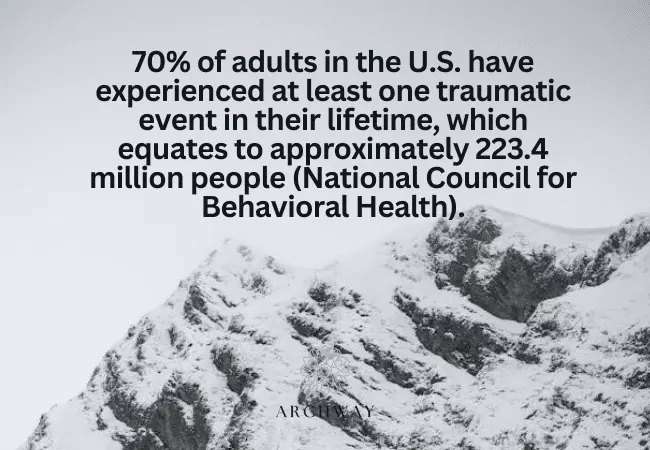Trauma is a deeply distressing experience that can affect an individual’s emotional, psychological, and physical well-being. Whether it stems from childhood abuse, neglect, domestic violence, assault, accidents, military combat, or other life-altering events, unresolved trauma can lead to long-term mental health challenges such as PTSD, anxiety, depression, and mood disorders.
At Archway Behavioral Health, our Trauma-Focused Therapy Program is designed to help individuals process their experiences, build emotional resilience, and regain control over their lives. We offer evidence-based treatment approaches at our Mental Health Treatment Center, integrating Cognitive Behavioral Therapy (CBT), Dialectical Behavioral Therapy (DBT), Individual Therapy, Group Therapy Programs, and specialized Trauma Treatment Programs to support lasting recovery.
This guide explores:
- What Trauma-Focused Therapy is and how it works
- Signs that indicate the need for trauma therapy
- Evidence-based treatment methods for trauma recovery
- Levels of care available for trauma treatment
- How to start trauma therapy at Archway Behavioral Health
What Is Trauma-Focused Therapy?
Trauma-Focused Therapy is a specialized form of therapy designed to help individuals process and heal from traumatic experiences. Unlike traditional therapy, it focuses specifically on:
- Identifying and addressing trauma-related symptoms such as anxiety, hypervigilance, flashbacks, or emotional numbness.
- Reshaping negative thought patterns and beliefs associated with the trauma.
- Teaching coping strategies to manage distressing emotions and triggers.
- Rebuilding self-esteem and trust in others.
Through structured, evidence-based mental health treatment services, trauma therapy empowers individuals to move forward without being defined by past events.
Signs That Trauma Therapy May Be Needed
Not everyone who experiences trauma develops post-traumatic stress disorder (PTSD) or other mental health conditions. However, when trauma remains unresolved, it can manifest in many ways, affecting daily life, relationships, and overall well-being.
Common Signs of Trauma-Related Mental Health Challenges:
- Recurrent nightmares, flashbacks, or intrusive thoughts about the traumatic event.
- Heightened anxiety or hypervigilance, feeling constantly “on edge.”
- Avoidance behaviors, such as avoiding places, people, or situations that trigger memories of trauma.
- Difficulty trusting others or forming healthy relationships.
- Emotional numbness, detachment, or feelings of emptiness.
- Self-destructive behaviors, including substance abuse, self-harm, or reckless decision-making.
- Mood swings, irritability, or episodes of intense anger.
- Depression, hopelessness, or loss of interest in life.
If these symptoms persist and interfere with daily life, seeking Trauma-Focused Therapy at a trusted Mental Health Treatment Center can provide the necessary support for healing.
Evidence-Based Treatment Approaches for Trauma Recovery
At Archway Behavioral Health, we use scientifically supported therapies proven to be effective in treating trauma-related conditions.
1. Cognitive Behavioral Therapy (CBT): Restructuring Thought Patterns
CBT is one of the most effective treatments for trauma, helping individuals challenge negative thoughts and behavioral patterns that result from traumatic experiences.
How CBT Helps Trauma Survivors:
- Identifies distorted thoughts related to the trauma.
- Teaches healthy coping strategies to manage distress.
- Encourages re-engagement with life and positive activities.
CBT has been shown to reduce PTSD symptoms by 60-80% when implemented in a structured treatment program (Journal of Clinical Psychology).
2. Dialectical Behavioral Therapy (DBT): Emotional Regulation and Coping Skills
DBT is particularly beneficial for individuals experiencing intense emotional distress, self-harm tendencies, or difficulties with interpersonal relationships due to trauma.
Key DBT Techniques for Trauma Recovery:
- Mindfulness to stay present and reduce emotional reactivity.
- Distress tolerance skills to manage overwhelming emotions without avoidance or self-destructive behaviors.
- Interpersonal effectiveness techniques to improve communication and build healthy relationships.
DBT is widely used in Trauma Treatment Programs and Bipolar Treatment Programs to enhance emotional resilience.
3. Trauma-Focused Cognitive Behavioral Therapy (TF-CBT): Specialized PTSD Treatment
TF-CBT is a trauma-specific therapy designed to help individuals—especially children, teens, and adults with PTSD—process their traumatic memories in a structured and safe environment.
How TF-CBT Helps:
- Reduces fear, anxiety, and distress associated with trauma.
- Helps individuals reframe traumatic experiences in a healthier way.
- Encourages gradual exposure to trauma-related memories to reduce avoidance behaviors.
TF-CBT is one of the most effective treatments for childhood trauma, sexual assault survivors, and individuals with PTSD.
4. Eye Movement Desensitization and Reprocessing (EMDR): Rewiring the Brain’s Trauma Response
EMDR is a specialized therapy designed to help individuals process trauma through guided eye movements and memory reprocessing techniques.
How EMDR Works:
- Helps reduce emotional intensity of traumatic memories.
- Allows the brain to reprocess distressing experiences more effectively.
- Provides long-term relief from PTSD, anxiety, and flashbacks.
Studies show that EMDR can reduce PTSD symptoms by 77-90% after just 6-12 sessions (American Psychological Association – APA).
Levels of Care in Trauma Treatment
At Archway Behavioral Health, we offer multiple levels of care to provide trauma survivors with the right level of support based on their needs.
1. Partial Hospitalization Program (PHP) for Trauma Recovery
- Provides structured, full-day therapy sessions in a supportive setting.
- Includes individual therapy, group therapy, and psychiatric care.
- Helps individuals transition from inpatient care to outpatient therapy.
2. Intensive Outpatient Program (IOP): Flexible Trauma Therapy
- Offers part-time therapy sessions while maintaining daily responsibilities.
- Focuses on relapse prevention, stress management, and emotional resilience.
- Ideal for individuals who have completed PHP or inpatient care.
3. Outpatient Trauma Therapy for Long-Term Recovery
- Weekly or biweekly individual therapy and group therapy sessions.
- Continuous support for emotional processing and coping skills.
- Helps individuals maintain long-term mental health stability.
Start Trauma-Focused Therapy at Archway Behavioral Health
Trauma should never define your future. At Archway Behavioral Health, we offer specialized, evidence-based Trauma Treatment Programs to help individuals:
- Process their trauma safely and effectively.
- Regain control over their emotions and reactions.
- Develop healthy coping strategies to move forward with confidence.
Conclusion
Trauma does not have to define your future. While the pain of past experiences can feel overwhelming, healing is possible with the right support, evidence-based therapy, and structured treatment. At Archway Behavioral Health, we believe that every individual deserves the opportunity to process their trauma, regain emotional stability, and build a fulfilling life free from the burdens of the past.
Through Trauma-Focused Therapy, Cognitive Behavioral Therapy (CBT), Dialectical Behavioral Therapy (DBT), and specialized Trauma Treatment Programs, we provide the tools and compassionate care necessary for long-term recovery. Whether you need intensive support through PHP, structured therapy through IOP, or ongoing outpatient care, we are here to help you reclaim your strength and resilience. Call Archway Behavioral Health at 888.488.4103 for a confidential consultation. Start your journey toward healing, empowerment, and emotional freedom today.
FAQ About Trauma-Focused Therapy
What is Trauma-Focused Therapy?
Trauma-Focused Therapy is a specialized form of mental health treatment designed to help individuals process and heal from traumatic experiences, such as abuse, violence, accidents, or military combat. It uses evidence-based approaches like Cognitive Behavioral Therapy (CBT), Dialectical Behavioral Therapy (DBT), and Eye Movement Desensitization and Reprocessing (EMDR) to help individuals manage trauma-related symptoms and regain emotional stability.
Who can benefit from Trauma-Focused Therapy?
Anyone who has experienced trauma and is struggling with PTSD, anxiety, depression, or emotional distress can benefit from trauma therapy. It is particularly helpful for individuals dealing with childhood trauma, sexual or domestic violence, military combat trauma, grief, or accidents.
What are the symptoms of unresolved trauma?
Signs that trauma therapy may be needed include intrusive thoughts, flashbacks, nightmares, avoidance behaviors, hypervigilance, emotional numbness, self-destructive tendencies, difficulty managing emotions, and mood swings. If these symptoms interfere with daily life, seeking professional support can be beneficial.
What types of therapy are used in Trauma-Focused Treatment?
At Archway Behavioral Health, we use scientifically backed, evidence-based therapies, including Cognitive Behavioral Therapy (CBT) to change negative thought patterns, Dialectical Behavioral Therapy (DBT) for emotional regulation, Eye Movement Desensitization and Reprocessing (EMDR) to process trauma, Trauma-Focused Cognitive Behavioral Therapy (TF-CBT) for PTSD, and Individual and Group Therapy for personal guidance and peer support.
What is the difference between PTSD and general trauma?
While both involve distressing memories, PTSD is a diagnosable condition that includes persistent flashbacks, nightmares, hypervigilance, emotional reactivity, avoidance, and dissociation, which make it difficult to function in daily life. General trauma may cause emotional distress, but not all trauma leads to PTSD.
What levels of care are available for trauma treatment?
At Archway Behavioral Health, we offer Partial Hospitalization Program (PHP) for intensive daily trauma therapy, Intensive Outpatient Program (IOP) for structured yet flexible support, and Outpatient Therapy for long-term trauma recovery and maintenance.



